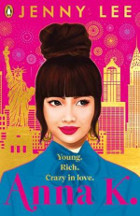Anna K by Jenny Lee

Penguin, 2020. ISBN: 9780241420218. 400pp.
(Age: Adult - Older adolescents) This is a story of rich adolescents
who attend wealthy schools, who like to party often and hard, using
drugs to enable an even wilder time and who like to stay out until
the early hours of the morning. Everything they wear is named for
its designer brand, as are their accessories and the cars that they
drive. They only shop in the most expensive stores in the city of
New York, and their social lives seem to be set in the best clubs,
where they drink, and use drugs freely, and party, often, until the
early hours of the morning.
While this story is about these young people's desire to party,
attending school is recognized as being very important in leading on
to their future and thus their careers. In this intense narrative we
are drawn into the frenetic lives of Anna, an exceptional young
woman who falls in love with "Count" Alexi Vronsky, learning about
their high level of competition, that is, to be the best, or to have
the best, in everything they do. Parents seem to figure in their
lives to a small degree, being busy making money themselves.
Money is at the heart of this novel, and its presence fuels both the
lifestyle, the choices, the futures, and, sadly indeed, the
disasters. While these party people face the challenge to do well
enough at school to enable them to go to the best colleges and
universities, one young man loses his way and his story is deeply
saddening. This aspect reminds the reader of the dramatic aspects of
the much-loved Russian epic tale that is reflected in Lee's book.
Overall, I found this to be a challenging novel. In that it is
intended as an evocation of Tolstoy's Russian epic, Anna
Karenina, we see how this novel serves as a reminder of some
of the pitfalls that young people face, especially in a community
where wealth creates a world of privilege. I would recommend this
book as suitable for both adults and older adolescents. Lee's
evocation of a past novel, one that was a powerful tome for its era,
recreates the disturbing reality of the modern world in her
depiction of one particular way of life.
Elizabeth Bondar